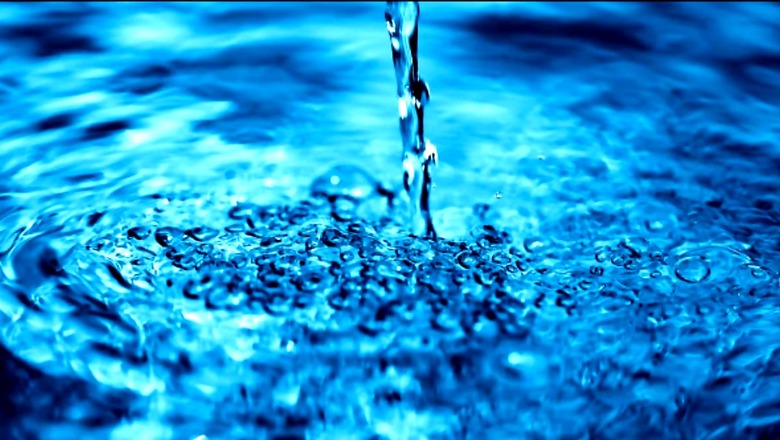
views
Conserving water is essential for a clean and healthy future. With the ever increasing pressure on freshwater resources owing to population growth and climate change, it becomes all the more important to adopt sustainable practices at this hour.
With newer technologies on the anvil and awareness drives, minimising water wastage seems plausible and will ensure the availability of clean water for future generations. Investing in water treatment and purification technologies will help in preserving the quality of our water sources. Conserving water not only safeguards the environment but also supports biodiversity and mitigates the impact of droughts and water scarcity.
Shivika Singh, Assistant Vice President, WAE Ltd, says, “Life is water. Despite the fact that it is a valuable resource that is becoming increasingly scarce, it is absolutely necessary for our survival. India is one of the world’s most water-stressed countries, and we must protect this essential resource. We waste millions of litres of water every day through careless behaviours like running the tap while brushing our teeth or not watering our lawns. These little activities amount to a lot of water misfortune, and they should be halted.”
Energy sector and water spending
On World Environment Day, we recognize the vital role of water conservation in securing a clean and healthy future while significantly influencing the energy sector. “Water conservation efforts have multifaceted impacts on energy, shaping a sustainable and resilient energy landscape. By conserving water, we reduce energy consumption in treatment and distribution, lowering greenhouse gas emissions and combating climate change. The water-energy nexus highlights the interdependence of water and energy systems. Water is essential for energy generation processes like power plants, hydropower, and cooling systems. Conserving water ensures a sustainable water supply, promoting clean and renewable energy sources,” says V M Jain, Chairman, Arham Group.
Water conservation supports renewable energy development, particularly hydropower. By preserving water resources, we guarantee a consistent supply for hydropower plants, fostering clean energy growth. Furthermore, water conservation addresses the energy-intensive nature of desalination, reducing energy demand and enhancing energy sector sustainability.
“Water conservation drives innovation and efficiency in water and energy management. Smart water management systems optimize usage and reduce consumption, contributing to a sustainable energy landscape,” adds Jain.
On this World Environment Day, we emphasize the importance of water conservation for a cleaner, sustainable energy future. Jain opines, “By reducing energy consumption, promoting renewable energy, and fostering innovation, water conservation paves the way for a resilient energy landscape that mitigates climate change and ensures water availability for generations to come. Together, let us commit to water conservation, securing a brighter future for our planet.”
Agricultural Practices involving water consumption
We must modify our agricultural practices to save water. Indian agriculture is currently one of the world’s most water-intensive and a major cause of water scarcity. New methods and technologies that will enable us to produce more food with less water need to be implemented. Farming records for 80% of India’s water utilisation.
“It’s not just about saving water to conserve water; it is likewise about safeguarding our current circumstance. We contribute to environmental degradation and pollution when we waste water. We can contribute to the preservation of our rivers, lakes, and oceans and create a more sustainable future for all by conserving water,” adds Singh.
Indian Households and their spending on water per person
India has a shortage of water. With a populace of 1.3 billion individuals and just 4% of the world’s freshwater assets, India faces a water emergency that is supposed to turn out to be significantly more serious before long.
The average Indian consumes more than twice as much water as the global average every day, using 150 litres. Singh feels we can all contribute to water conservation. Here are a few basic hints:
Repair broken faucets
When you are brushing your teeth, turn off the tap
Make your showers shorter
Your lawn will need less water
Compost and recycle
Encourage water-saving products
Participate in your community’s efforts to conserve water
We can contribute to water conservation and environmental protection by taking these easy steps.
A larger overview
Shraman Jha, CEO Hindustan Unilever Foundation and Co-Chair, FICCI Water Mission, says, “Today, World Environment Day, is an apt moment to reflect if we are applying the same principles to our planet- our only source of natural resources, like water. And very specifically, to the availability of freshwater. Are we endlessly drawing on the resources without ensuring that we are also replenishing them? Well, then, it would be like endlessly spending on your credit cards without making a payment. Sooner than later, the luxury of living on borrowed resources will run out. In the case of water, we are borrowing not just from future generations- but also from our own lifetimes.”
How is it that a large country like India, which is well endowed with rivers flowing through it and a good seasonal rainfall pattern, has any concern about water? 16 per cent of the world’s population lives in India, but our country has only four per cent of the world’s freshwater resources.
“The worst kept-secret about water in India is the overdependence on groundwater- and its relentless extraction in recent decades. The use of groundwater, aided by modern pumping and power systems, has grown exceptionally fast nationwide. For example, in the last five decades, the number of borewells in India has increased from one million to more than 20 million –more than the US and China combined,” adds Jha.
The Central Groundwater Board of India (2022) estimates that about 14 per cent of groundwater blocks are over-exploited (meaning the rate at which water is extracted exceeds the rate at which the aquifer can recharge). Groundwater resources serve about 85% of the domestic water supply in rural areas, 45% in urban areas, and over 60% in irrigated agriculture.
Agriculture is the largest consumer of water in India, accounting for around 80% of the total water use in the country. However, India has one of the lowest water productivity rates in the world, meaning that we use more than the required quantity of water to produce a unit of crop yield. With limited access to major irrigation works, much of these water needs are met by groundwater. This is not an exhaustible resource. Indeed, groundwater levels are dropping by more than a 1 metre a year in much of the fertile north Indian plains.
UN documents state that climate change is primarily a water crisis. This takes shape as we witness its impacts through floods, rising sea levels, shrinking ice caps, and droughts. But then, water is also a potent tool to combat climate change. Sustainable water management is, therefore, central to reducing carbon emissions and protecting ecosystems. Everyone has a role to play – individual and household-level actions are vital.
There is a strong silver lining, though. The consciousness around freshwater availability is rising within the government and the communities. Plans like the Jal Jeevan Mission, Atal Bhujal Yojna and MNREGA aim to “invest” in freshwater. The sustained messaging around “more crop per drop” has heightened the value of water.
“This year, let us also think about one of the major pollutants of water, plastics which impact much of the freshwater bodies before reaching the oceans. Just how large is the quantum? The World Economic Forum (WEF) has projected that there will be more plastic than fish in the oceans at the present rates unless strong steps are taken! Worldwide, we need to layer in the impact of plastic pollution – it is not just an eyesore, but an important pollutant to life-giving water.
So, can we continue overdrawing without ensuring replenishment? As in finance, the answer for groundwater is also a resounding “No”. The best investment we can make this year is making fresh water a sustainable cycle- to use wisely but not waste and exhaust,” opines Jha.




















Comments
0 comment